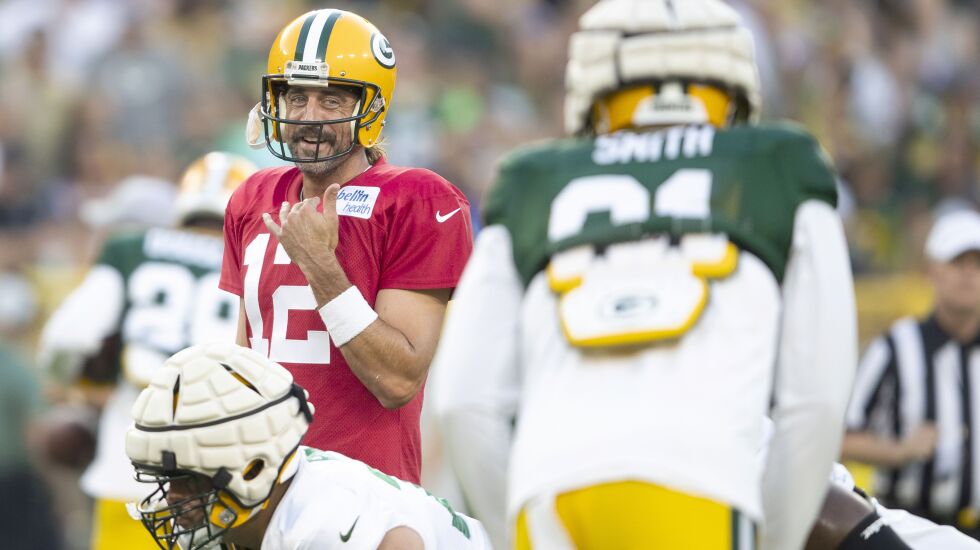
By now you’ve heard the Aaron Rodgers gags about his looks and his dabbling in the land of psychedelia: Rodgers will soon be starring as Nicolas Cage in ‘‘Con Air II,’’ ayahuasca boils will replace fish boils in Green Bay, Cheesehead hats are soon to become mushroom heads . . .
It’s pretty easy to chuckle with condescension when thinking about the Packers quarterback’s tales of downing the psychedelic plant liquid known as ayahuasca, a boiled concoction containing the psychoactive component DMA, which isn’t considered a violation of the NFL’s drug policy.
Rodgers took ayahuasca trips to Peru in 2020 and 2021, he stated on a recent podcast with health guru Aubrey Marcus, in order to find ‘‘self-love.’’
Apparently, he found it. For Bears fans still chuckling, just know Rodgers’ love for beating the Bears is limitless. He is a stunning 23-5 against them for his career, and he’s quite aware of this.
The Packers swept the Bears last season, and during their 24-14 victory Oct. 17 at Soldier Field, Rodgers informed end-zone fans after a score, ‘‘I own you! I still [expletive] own you!’’
Yep, he does. Anybody remember his six touchdown passes against the Bears at Lambeau Field in 2014 — in the first half? There are too many similar Rodgers-led Bears spankings to recount.
So, much as you’d like to say this guy is just a weirdo, a California nutball doing the trendiest of self-help stuff, you can’t write it off so fast. Maybe you can’t write it off at all.
I remember Phil Jackson being put at the helm of the Bulls in 1989 by then-general manager Jerry Krause, back when previous coach Doug Collins seemed to have the young Michael Jordan-led team on the move. Jackson as an NBA leader seemed insane.
Phil was all hippie and spirit seeker and sage-burning space cadet. Or so it seemed. Six NBA championships later, minds changed. In fact, Jackson’s 2006 book, ‘‘Sacred Hoops,’’ is the most thought-provoking treatise on the craft of coaching basketball and team-building anywhere.
So chuckle at Rodgers’ Beatles-era spiritual quest and cornball statements of self-discovery with the help of a Schedule-1 drug that is technically illicit in the United States. When he says, as he did, that his current goal is ‘‘to continue to give out a permission slip for people to be unapologetically themselves,’’ ask if he means that for young Justin Fields, too. He probably does.
His hope as a human, he said, is ‘‘for other people to feel comfortable embracing their truth and living their best life, whatever that looks like, and stepping into their own power.’’
Hmm.
Obviously, that ‘‘power’’ doesn’t entail somebody from Chicago beating the Packers.
No, Rodgers hasn’t gone all soft and gentle because of his quest. In fact, the opposite seems true. As he was quick to point out, he did his ayahuasca ventures before consecutive MVP seasons. That makes four MVP awards for his career and the listing of him with the greatest quarterbacks of all time.
His mental seeking, of course, is not ours. But peaceful mental health is everybody’s goal, whether we realize it or not. A lot of former NFL players become advocates for marijuana and other drugs they find soothing or which help them adjust to a non-sports world they don’t know much about.
In truth, many elite athletes are very immature. They are stunted because they have only thought about themselves and about winning, vital needs in their hyper-competitive careers. But those narrow focuses have led to a shortchanging of self. So they seek.
Think here of Jake Plummer’s medical mushroom farm. Or Ricky Williams’ Highsman cannabis company. Or just remember that drugs move from being taboo to accepted, depending on the mood of the country.
Last year, a marijuana dispensary popped up two blocks from my house. A person can quickly and legally buy enough pot there to have earned him or her a hefty prison sentence if this were 2000.
Bears offensive coordinator Luke Getsy, who once was Rodgers’ position coach, was asked Friday about his former pupil’s South American ayahuasca journeys.
“I was not invited on those trips,” Getsy said, grinning. “I didn’t know all that stuff.’’
None of us did. But now we do. Psychoactives such as ketamine and even LSD are now being scientifically studied for their ability to help with a host of mental issues.
Rodgers might be something of a guinea pig here in this chemical research. So far, I guess we’d have to call the experiment a qualified success.







